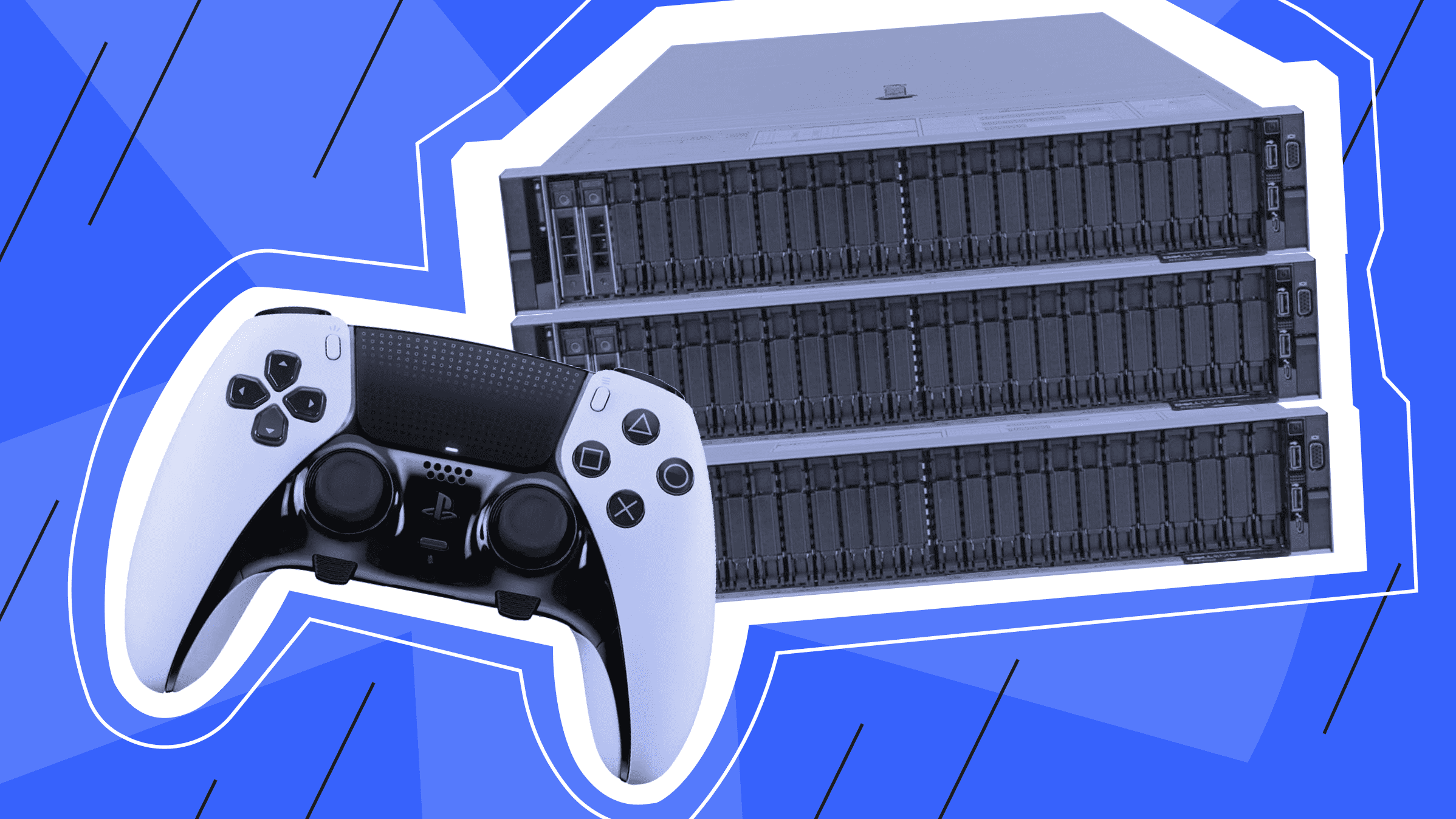
A growing trend in the entertainment industry called crypto gaming is set to change how players interact with digital assets. According to the Blockchain Gaming Market Report, the global blockchain gaming market was valued at over $4.6 billion in 2023. By 2027, it is projected to exceed $65.7 billion, growing at a CAGR of 70.3%. This growth is the result of the integration of cryptocurrency and NFTs, allowing players to securely own, trade, and monetize in-game assets. As more developers adopt blockchain technology, crypto gaming has the potential to disrupt traditional gaming models, offering new opportunities for both players and investors.
What is Crypto Gaming and How Do Crypto Games Work?

Crypto gaming refers to games built using blockchain that incorporate crypto assets such as NFTs or tokens. Crypto gaming technology uses a decentralized distributed ledger system to store and manage transactions, investments, and player data. Blockchain ensures security, transparency, and ownership of in-game items such as skins, weapons, and characters that players can freely trade or sell. This is different from traditional centralized systems where developers control everything. With this upgrade, players can gain ownership of digital assets used across multiple games and platforms. This decentralized ownership also ensures players retain control of their digital items even if the game shuts down or changes its rules.
Crypto gaming works by integrating blockchain technology into the game architecture. Blockchain is integrated through NFTs and tokenization, which we will cover in the following sections.
NFTs and Gaming Assets in Сryptogaming
Players use cryptocurrency to purchase in-game assets (items, characters, or currencies) in the form of non-fungible tokens (NFTs). These tokens ensure that each item is unique and belongs to only one player. Blockchain technology provides transparency and guarantees the uniqueness of items by recording all transactions related to their purchase, sale, or trade. Players can also earn cryptocurrency rewards by playing games, completing tasks, or competing in tournaments. This is where tokenization comes into play.
Accelerate your work with large data sets and graphics projects by renting a dedicated GPU server.
Tokenization in Сryptogaming
Asset tokenization in crypto gaming is the process of converting in-game assets into digital tokens on a distributed ledger or blockchain. Tokens that can be used in a game represent value and can be bought, sold, or used on various platforms. Players can buy crypto game coins or earn tokens that have real value and are securely stored in crypto wallets. In other words, blockchain technology ensures that property acquired as tokens remains private and cannot be altered by external entities, including government agencies.
Play-to-Earn Models in Сryptogaming
Play-to-earn (P2E) models expand the gaming ecosystem by allowing players to earn cryptocurrency or NFTs by completing tasks, winning battles, or participating in tournaments. This model has created new economies where players can earn money from gaming skills. In the P2E model, games simultaneously serve as entertainment and a source of income. Game mechanics and rewards can vary greatly, but the principle remains the same: the game encourages players to play and improve.
The Role of Blockchain in Game Development

Blockchain technology's role in game development is significant and offers several benefits for players and developers.
First, blockchain provides a decentralized system, allowing players to own assets as non-fungible tokens (NFTs) that they can trade or sell on international markets. In traditional games, assets such as characters, weapons, and skins are usually controlled by game developers and cannot be transferred or traded by players outside the game environment. Blockchain gives players greater autonomy and value in blockchain games by providing transaction transparency and actual asset ownership for players.
Second, blockchain offers developers new methods to create transparent, secure, and intelligent contract-driven in-game economies. These self-executing contracts automate transactions and enforce rules without the use of intermediaries. This creates opportunities for player-driven economies, where participants shape the gaming ecosystem, and supply and demand determine the value of digital assets, improving both the gaming experience and player engagement.
Benefits of Decentralization for Gamers
By integrating blockchain, developers improve the gaming experience while providing players more freedom and control over their assets. This section summarizes the role of blockchain in game development and highlights several key benefits.
- Digital Asset Ownership. Decentralization allows players to actually own in-game NFTs that can be stored, transferred, or traded regardless of the game developer’s platform. This means players will not lose their assets if the game is closed.
- Interoperability. Blockchain allows assets to be used across multiple games, increasing their value and utility.
- Transparency and Security. Transactions and ownership records are immutable on the blockchain, ensuring the integrity of the in-game economy and trades.
- Play-to-Earn Features. Players can earn cryptocurrency or valuable NFTs through gameplay, tournaments, or missions, creating real-world value from their virtual gaming experience.
How is Cryptocurrency Integrated into Games?
Adding cryptocurrency to games transforms how players interact with the game, offering new ways to earn, trade, and own in-game assets. By leveraging blockchain technology, players can own digital items, earn cryptocurrency, and participate in the game’s decentralized economy. In the following sections, you’ll learn how this works, along with an overview of platforms that support crypto gaming and leading crypto games.
Popular Blockchain Platforms

In crypto games, blockchain platforms such as Ethereum, Solana, or Binance Smart Chain are utilized to process transactions and manage assets. Players can connect crypto wallets to the game, allowing them to store, trade, and sell in-game items on various marketplaces. Here are some popular blockchain platforms for developing crypto-integrated games that support transaction processing, smart contracts, and asset management:
- Ethereum
Ethereum is one of the earliest blockchain gaming platforms that supports a wide range of crypto games and NFT marketplaces. Ethereum differs from Bitcoin (BTC) in its creation of smart contracts. A smart contract on the Ethereum blockchain acts like an autonomous computer program that executes automatically when certain conditions are met. Thanks to blockchain technology, the smart contract code runs exactly as programmed without being subject to downtime, censorship, fraud, or third-party interference. However, high fees can be a drawback.
- Binance Smart Chain (BSC)
BSC is a blockchain platform compatible with the Ethereum Virtual Machine (EVM) and can run generic intelligent contracts. It is a base layer 1 (L1) solution that offers lower fees and faster transactions than Ethereum. BSC is a popular choice for developers building decentralized games.
- Polygon
Known for its scalability and low fees, Polygon (formerly Matic) has become a popular platform for many P2E games, enabling fast and cost-effective transactions. This Ethereum scaling platform allows developers to build decentralized applications with low transaction costs. Polygon addresses Ethereum’s issues, such as poor performance and high gas costs.
- Solana
Solana’s high-speed, low-cost blockchain infrastructure makes it suitable for real-time gaming applications, enabling faster game interactions. In 2024, the Solana project gained popularity for issuing meme tokens on its blockchain.
- Immutable X
Immutable X is an Ethereum Layer 2 (L2) scaling solution. Its goal is to reduce gas costs and ensure smooth NFT trading, which is useful for gaming.
Overview of Leading Crypto Games

In this section, we will introduce some crypto games that have gained popularity due to their engaging mechanics and integration of blockchain technology. By implementing cryptocurrency, these games enhance the gaming experience and create new economic models, allowing players to create real value from their virtual actions.
- Axie Infinity
Axie Infinity is a token-based online video game released in 2018 and developed by the Vietnamese studio Sky Mavis. It is known for its in-game economy, which uses Ethereum-based cryptocurrency.
Axie Infinity is one of the most popular P2E games. Players can collect, breed, and battle creatures called Axies to earn the in-game cryptocurrency SLP (Smooth Love Potion) and the governance token AXS. Axie Infinity has attracted a large player base thanks to the game’s robust marketplace for Axies and land-based NFTs.
- The Sandbox
The Sandbox is a sandbox game developed by the game studio Pixowl for mobile phones (iOS and Android) and Microsoft Windows. It was originally released in 2012 and was released for PC on Steam in 2015.
Players in this virtual world can create, own, and monetize their gaming experiences and assets using NFTs. Using the top gaming crypto SAND in-game, they can buy virtual land, construct buildings, and trade goods on a decentralized marketplace.
- Decentraland
Decentraland is a decentralized virtual reality platform that was launched in 2020. Players can buy, develop, and sell virtual land in NFTs. Users can transact using MANA cryptocurrency and create interactive properties such as virtual stores, games, and art galleries.
- Gods Unchained
Gods Unchained is the first crypto collectible card game, announced in 2019. Players can earn and trade NFT-based cards, receiving GODS tokens as rewards. Valuable cards can also be sold on the open market.
- Star Atlas
Star Atlas is a 2024 space-themed strategy game built on the Solana blockchain. Players can travel the galaxy, participate in battles, and purchase in-game assets such as planets and spaceships with NFTs.
Challenges Faced by Crypto Games

Even as cryptocurrency becomes more popular, the industry faces several significant challenges that could impact its growth and adoption. Key challenges include scalability, regulatory issues, and market risks.
Scalability Issues in Crypto Gaming
One of the main challenges in crypto gaming is scalability. Blockchain networks like Ethereum, commonly used for developing crypto games, often face limitations when simultaneously processing a high volume of transactions. The primary scalability issues include:
- High transaction fees. Gas fees can increase dramatically as users and transactions increase, making in-game actions or NFT trading expensive.
- Slow transaction speeds. High network congestion can slow transaction processing times, impacting gameplay, especially in real-time games requiring quick responses.
- Blockchain limitations. While some blockchains offer scalable solutions (such as layer 2 networks like Polygon or Optimism), implementing such solutions into games requires much development effort and can sometimes be challenging.
Solution:
To address scalability issues, some developers are using high-performance blockchains like Solana and Binance Smart Chain, as well as specialized gaming blockchains like Immutable X. While these platforms offer faster transactions and lower fees, they may face other issues related to interoperability or decentralization.
Get the most out of your budget with our affordable, efficient VPS solutions. Fast NVMe, 30+, and perfect support.
Regulatory Issues and Market Risks in Crypto Gaming
Cryptocurrency gaming relies on play, money, and digital assets and is subject to regulation and market risks that may impact development. Key regulatory concerns and market risks include:
- Legal Uncertainty
Cryptocurrency developers and players are uncertain due to varying national laws regarding cryptocurrencies, digital assets, and gambling. Some countries may have laws that restrict P2E gaming or in-game assets if they are considered gambling or securities.
- NFT Ownership and Taxation
In some jurisdictions, owning NFTs and in-game cryptocurrencies may have tax implications, making it difficult for players and developers to comply. Questions about the legal rights associated with digital assets also add to the uncertainty.
- Market Volatility
Cryptocurrency markets are highly volatile, and the value of in-game tokens or NFTs can fluctuate significantly, impacting the financial incentives offered to players. A market downturn could result in a decline in player interest in crypto gaming, leading to a decline in revenue and active users.
- Risk of Fraud and Scams
The instability of the crypto space increases the risk of fraud and hacking attacks, which could undermine trust in the crypto gaming industry. Phishing attacks, scams, or vulnerabilities in intelligent contracts could result in the loss of player assets.
Solution:
Continuous innovation, regulatory clarity, and risk management strategies are the leading possible solutions to addressing regulatory challenges and market risks, promoting the growth and sustainability of crypto games.
Why Crypto Gaming is Disrupting the Industry
To sum it up, it is safe to say that play-to-earn models, decentralized economies, and true ownership of in-game assets have transformed crypto games and the gaming industry. These features have changed how players interact and relate to games, adding new levels of participation, monetary rewards, and freedom in virtual worlds. These are the disruptive factors of crypto games.
The concept of real asset ownership is one way that crypto games are disrupting the industry. In traditional games, players spend hours and real money to acquire in-game items but do not actually own those assets. Players have nothing to keep because they are locked into the game’s ecosystem, and if the game closes, they lose everything.
Crypto games, on the other hand, allow players to have complete control over all assets in the game using blockchain technology and NFTs. Blockchain-based players can create new economic opportunities and generate significant value by trading, selling, or transferring these assets between different games or markets.
Another disruptive factor is the rise of “play to earn” models. In traditional games, players only spend time and money on entertainment. Conversely, crypto gaming players can earn real value using cryptocurrency or NFTs. For example, in games like Axie Infinity, players earn tokens for completing tasks or winning battles. These tokens can be exchanged for fiat money or other cryptocurrencies. This economic model allows games to generate ongoing engagement and income for many players worldwide, especially where traditional labor markets are unavailable.
Decentralization is another cornerstone of crypto gaming disruption. Corporations control traditional games by setting the rules, finances, and updates. In contrast, many crypto games operate on decentralized platforms, where a community of players uses tokens or DAOs (decentralized autonomous organizations) to influence decisions. This player-centric approach gives players a sense of ownership and control, allowing them to directly influence how games are created and developed.
When decentralized finance (DeFi) is introduced, entirely new financial ecosystems emerge. Players can bet on in-game assets by combining gaming with investment options, earn income, or participate in liquidity pools.
Because they provide P2E mechanics, decentralized control, real asset ownership, and financial opportunity, crypto games are disrupting the industry. These developments are changing how games are connected to each other, creating more dynamic and engaging experiences beyond simple entertainment.
Conclusion
Crypto gaming has evolved from a niche experiment to a rapidly growing industry that is changing the gaming industry. What started as a simple ecosystem of blockchain-based collectibles is now a broad ecosystem of play-to-earn models, NFT-based games, and virtual worlds. With this transformation, players can enjoy the game while earning money, trading, and owning digital assets with real-world value. The industry has also thrived due to the increased transparency, decentralization, and player-driven economy that the integration of blockchain technology has enabled.
Continuous innovation and solutions to scalability, interoperability, and user experience issues make the future of crypto gaming promising. Crypto gaming can become increasingly mainstream, providing new opportunities for developers, investors, and gamers as blockchain technology matures and regulations become clearer. Despite the current challenges, the industry’s movement points to a dynamic and exciting future where money and games will merge to create a new era of interactive digital entertainment.
Dedicated Server
Smooth operation, high performance, and user-friendly setup - it's all there for you.
From $70.00/mo

